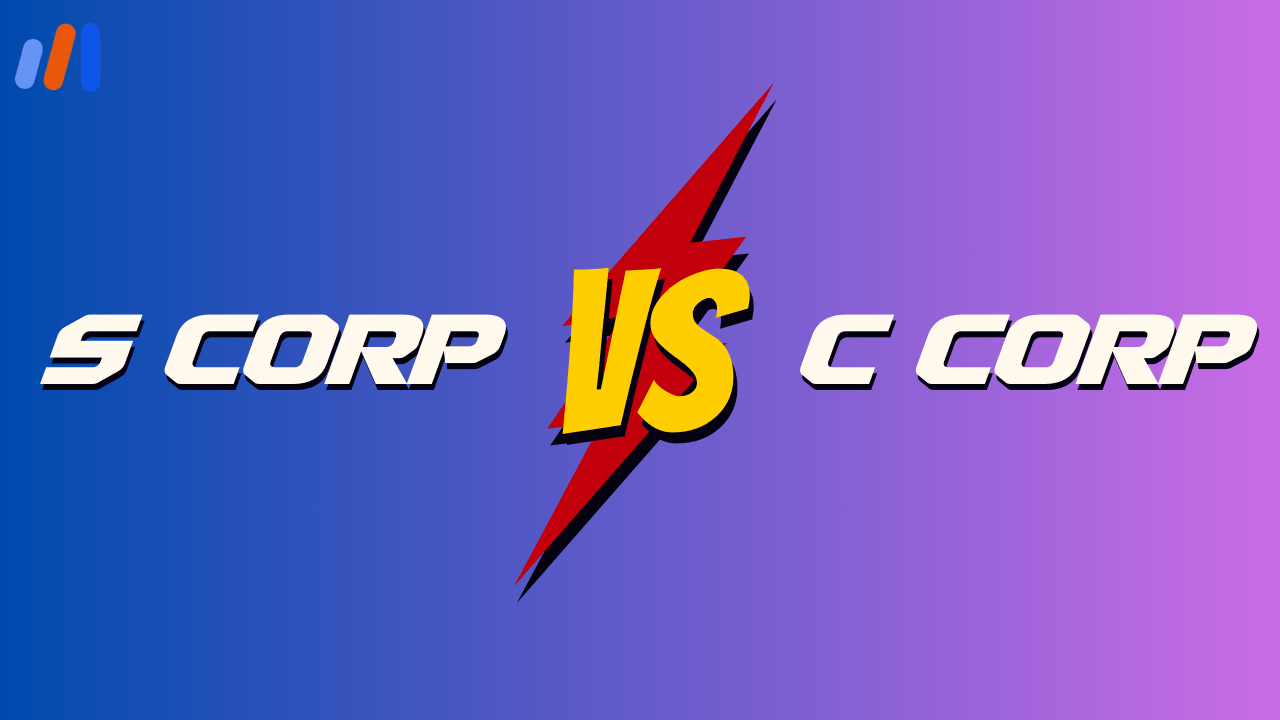If you are thinking about embarking on a new business venture or expanding an existing business on an exciting journey, choosing the appropriate business structure is crucial as it directly impacts taxation, legal protection, and growth potential.
Understanding the difference between S-corp and C-corp business structures is crucial for making an informed decision for a strong legal foundation for your business, as both types of corporations offer unique benefits and limitations.
S corporation (S-corp) and C corporation (C-corp) as a business structure are two different types of business entities. While these two business entities share some similarities, there are differences in taxation, ownership restrictions, stock options, and employee benefits that set them apart from one another.
Before studying the differences and similarities between S corporation (S-corp) and C corporation (C-corp), first, let’s discuss what a corporation is.
What is a Corporation?
A corporation is a type of business legal entity that is considered distinct and separated from its owners.
A corporation’s owners are also known as shareholders, and a corporation also has officers and directors who run the business. As a legal entity, a corporation is considered separate from its shareholders, meaning shareholders are not personally responsible for the debts of the corporation.
Corporations can take loans and borrow money, sue and be sued, enter contracts, own assets, hire employees, and pay taxes.
What is a S Corp?
An S Corp is a business structure and tax designation that passes its taxable credits, income, losses, and deductions directly to its shareholders. S-corps are exempt from a federal corporation income tax instead, income from dividends is taxed only at the individual level. This means if shareholders can meet certain criteria, corporate losses can offset income from other sources. S-corp receives all the same protection from liability offered by corporation status as a separate entity.
Several strict conditions to operate as an S-corp can disqualify a business that might otherwise seek the status. S-corporation can’t exceed more than 100 shareholders, effectively ruling out corporations that want to go public. Ownership is restricted largely to individuals, who must also be citizens or permanent residents of the U.S., and to certain domestic trusts, estates, and tax-exempt organizations.
What is a C Corp?
A C corp is the most common corporate tax status. Tax requirements are the key attributes that make a C corp a C-corp and an S-corp an S-corp. C corp is an independent legal entity that its shareholders own possesses unlimited growth potential and is subject to limited liability company double taxation, which means that the corporation itself is first taxed at the federal corporate tax rate of 21%, and any dividends or profits the company passes on to its shareholders are taxed a second time as personal income.
C corps are desirable because there is no restriction on who can own shares. Other businesses and entities both in and outside the U.S. can hold ownership of a c corp. There is also no limit to the total number of shareholders. Its shareholders are also afforded the full liability protections of any corporation.
Similarities between S Corp and C Corp
Both S-corp and C-corp get their names from the part of the Internal Revenue Code (IRC) under which they are taxed. Both entities are taxed under subchapter S and subchapter C, respectively. Both entities shield the owners’ assets from corporate debts and liabilities, ensuring that the shareholders are not personally or financially responsible for the business expenses and obligations. Let’s discuss the similarities between S-corp and C-corp in brief:
- Limited Liability Protection:
Both the S-corp and C-corp enjoy limited liability protection, which means owners’ assets are safeguarded from the claims of the business creditors, and they are not at all responsible for the financial obligations of the company.
- Legal entity:
Both the S-corp and C-corp are subject to specific legal requirements to maintain their corporate status. S-corp and C-corp both corporations require the filing of articles of incorporation, holding annual meetings, filing reports, and paying taxes as a part of their legal obligations.
- Incorporation:
Both the S-corp and C-corp are incorporated identically. One must complete the proper incorporation documents, file articles of incorporation, appoint a registered agent, and create corporate by-laws.
- Corporate formalities:
Both the S-corp and C-corp are required to have the same formal filings, and annual meetings, and must pay annual fees. Both must have bylaws, issue stock, and are usually required to have a board of Directors. Both types of corporations are mandated to comply with state and federal regulations, file annual reports, and pay fees and taxes.
Differences between S Corp and C Corp
Important differences between an S-corp and a C-corp are included in their formation, taxation, ownership, stock practice, and employee benefits. You can decide on the type of corporation that is right for you by learning about the differences between these models. Keep the following factors in mind when deciding between the two types of corporations:
- Formation
C corporation is a type of corporation that is designed for the company by default when it files its article of incorporation. A C corporation may convert to an S corporation by filing IRS Form 2553, election by a small business corporation, with the IRS if it so chooses. There may also be state forms to file to obtain S corporation status for state tax purposes. This then legally changes the company from a C corp to an S corp.
To obtain S corp status for a certain year, you must file form 2553 by 15th March of that calendar year for corporations operating on a calendar year basis. Corporations operating on an alternative fiscal year can file no later than the 15th day of the third month of the fiscal year.
- Taxation
The main reason why people choose S corp over C corp is taxation, as S corp doesn’t pay corporate income taxes. This way, S corp avoids double taxation. S corp avoid the business tax by paying their income to the business owners directly. Whereas C corps are taxed differently. There is double taxation in the case of C Corp in which there is corporation tax as well as the tax on the stakeholder’s dividends.
Many states also pass profits and losses through to the owners of S corporations. However, a few states unfortunately engage in double taxation of s corporations. This is a key factor to take into account as a business owner when deciding where you want to incorporate.
- Ownership:
Both US residents and US citizens can be shareholders of an S corp. An S corp is permitted to have a maximum of 100 shareholders. Even teenagers who are 18 years old can become shareholders in an S corp, but many other entities, like partnerships and trusts, are prohibited from holding stock in an s corp. This is an important factor to consider. Whereas you do not need to be a US citizen or a US resident to be a shareholder in a C corp. This makes the ownership requirements for a C corp much more flexible than for an S corp.
| C-corporation | S-Corporation | |
| Formation | Articles of incorporation | Articles of Incorporation and IRS Form 2553 |
| Formation cost | Comparatively low cost | Higher cost |
| Membership | No limited Number of owner | Maximum of 100 owners |
| Taxes | Need to pay taxes on business income | Exempt for some taxes, corporate income tax |
| Shareholders | Can be domestic or international | Only Domestic must be US citizens or Residents |
| Class of stock | Can issue multiple classes of stock | Limited to one class of stock |
C corp VS S corp Comparison Table
Pros and Cons of S Corp
In many cases, the advantages of S corporation outweigh the perceived disadvantages of S corporation. If one needs to transfer ownership or discontinue the business, the best form is usually the S corporation structure. These advantages are not usually available for sole proprietorships and general partnerships.
Pros of the S Corporation:
- Protected assets.
An S corporation protects the personal assets of its shareholders. Absent an express personal guarantee, a shareholder is not personally responsible for the business’s debts and liabilities. Creditors cannot pursue the personal assets, such as the house, bank accounts, etc., of the shareholders to pay business debts. Forms of business, such as sole proprietorships and general partnerships do not provide the same protection because their owners and the business are legally considered the same which puts personal possessions in jeopardy.
- Pass-through taxation.
An S corporation does not itself pay federal taxes. The majority-but not all-of the states follow the professional association federal rules. It means that business losses may be used to offset other income on the tax returns of the shareholders. This can be very beneficial in the start-up period of a new business.
- Tax-favorable characterization of income.
S corporation shareholders are allowed to be employees of the business and draw salaries as employees, in addition to receiving dividends from the corporation, and other distributions that generally are tax-free to the extent of their investment in the corporation. Because a reasonable characterization of distributions as salary or dividends will help the owner-operator reduce self-employment tax liability, and generate business-expense and wages-paid deductions for the corporation,.
- Straightforward transfer of ownership
Interest in an S corporation is freely transferable without generating adverse tax consequences. The S corporation will not have to make adjustments to the property basis or apply a complicated set of accounting rules in the event of a transfer of an ownership interest.
- Increased credibility.
By operating as an S corporation rather than as a sole proprietorship or partnership, a new venture may be able to enhance its credibility with customers, employees, vendors, and partners because it is demonstrating a serious long-term commitment to the firm.
Cons of the S corporation:
- Formation and ongoing expenses.
To be treated as an S corporation you need to first incorporate your business by filing Articles of Incorporation with your desired state of incorporation, obtaining a registered agent for your company, and paying the appropriate fees. Most states also charge ongoing fees, for example, annual report and/or franchise tax fees. Although these fees generally are not costly and can be deducted as a cost of doing business, they are formalities and costs that a sole proprietor or general partnership will not have to pay. (Also, an S corp has beneficial ownership information, or BOI, reporting requirements, unless it is exempt. There is no fee to file a BOI report directly with FinCEN.)
- Tax qualification obligations.
Errors concerning the many election, consent, notification, stock ownership, and filing requirements can inadvertently result in S corporation status termination and can leave the corporation as a taxpaying entity under Subchapter C. Although this is relatively rare, and usually can be fixed easily, it remains an issue that is not a consideration with other pass-through tax classifications.
- Limitations of stock ownership.
An S corporation may not have more than one class of stock, although it can have voting and non-voting shares. Therefore, there can’t be different classes of investors who are entitled to different dividends or distribution rights. In addition, there cannot be more than 100 shareholders. Ownership is precluded by foreign investors whose ownership exceeds certain prescribed levels, as well as ownership by certain types of trusts and other entities.
- Less flexibility in allocating income and loss.
Because of the one-class-of-stock requirement, an S corporation can’t pass losses or income to any particular shareholder. How income and loss are allocated is determined by stock ownership, as compared with partnerships or LLCs that are taxed as partnerships where the allocation may be determined in the partnership agreement or operating agreement.
Pros and Cons of C Corp
Pros of the C Corp:
- A corporation is separate from its owners
Having been incorporated a company takes on a life of its own, with its rights, capacities, duties, and liabilities. this means that a company can prosecute, or defend, an action in its own name. It can acquire, own, and use its own real or personal property; enter into its contracts and guaranties; lend money and invest funds.
- A corporation offers the owner the benefit of limited liability protection
Because a corporation is a separate entity, its debts, obligations, and liabilities are its own. Those who do business with a corporation must look to the company to satisfy any obligations owed to them, and not to the shareholders. The shareholders’ exposure to loss is limited to the amount invested in the corporation.
- A corporation has a perpetual existence
Since a corporation exists independently of the shareholders, a corporation has perpetual existence. In the case of the death of the owner, the sole proprietorship automatically comes to an end, but it is not so in the case of a corporation. Once a corporation is formed, it automatically exists until it is dissolved, wound up, and liquidated, unless otherwise stated in its articles of incorporation. Furthermore, the continuance of the corporation is not affected by the transfer of shares of stock.
- Free transferability of shares
An owner of a share of corporate stock has both economic and management rights. Those shares may be sold by that shareholder and the purchaser will become the shareholder with all of those rights. An LLC member may sell his or her economic rights but not the management rights. Unless the operating agreement provides otherwise, the member in an LLC has to get consent from the other members to sell the whole interest and have the buyer become a member.
- C corporation more attractive to investors
Among the advantages that a C Corp has over an S Corp or Limited Liability Company (LLC) is the fact that it is much easier to attract investors, including raising equity capital financing. Generally speaking, ownership via shareholdings is better considered than ownership via LLC membership interests. Additionally, venture capitalists prefer investing in C corporations. Many venture capitalists cannot invest in S corporations or LLCs because of restrictions in their governing documents and tax laws. Also, companies planning an initial public offering generally prefer corporations to LLCs and cannot choose S corporation tax status because of the 100-shareholder limit. It may also be easier for a corporation to obtain bank financing. This factor can be particularly important for capital-intensive businesses.
- There are no restrictions imposed on the shareholders.
Unless the corporation’s governing documents say otherwise, there are no restrictions on C corporate stock ownership. In contrast, the tax laws impose many restrictions on S corporation stock ownership. For example, individuals who are not US citizens or resident aliens cannot be S corporation stockholders. Corporations and LLCs cannot be stockholders in an S corporation either. Additionally, S corporation stock is restricted to no more than 100 shareholders.
- Shareholders do not directly control the corporation
Corporations are managed by a board of directors who in turn appoint the officers that administer the day-to-day functions. This is statutory in all state incorporation statutes. A shareholder is entitled to his economic rights in the form of dividends, voting, or otherwise, as provided by the type and number of his shares, but the shareholder does not have the right to directly control the day-to-day operations of the corporation. The rights of the shareholders are limited to: the election of directors, removal of directors in specific situations, voting on certain fundamental changes to the corporate form, such as a merger or dissolution, and inspection of certain books and records.
- Corporations offer many tax planning opportunities
It might be a little more complex to operate as a corporation, but it also provides the greatest array of tax planning tools throughout the cycle of business. The various tax implications of a C corporation versus an S corporation or LLC should be discussed with a trusted tax adviser.
Cons of the C Corp:
- Complexity
Now, a C corporation is more complex to operate than an LLC. For instance, corporation laws require more formalities in the way a corporation is managed and controlled. For example, there have to be shareholder meetings and director meetings. Notice needs to be given properly, and minutes need to be kept. On the other hand, LLCs can be managed much more informally. The Corporation laws also tend to have stricter requirements for record-keeping.
- Double taxation
A C corporation is a separate tax-paying entity unless it makes an election to be taxed as an S corporation. Accordingly, a C corporation pays corporate income tax on its income, net of offsetting income with losses, deductions, and credits. A corporation distributes its after-tax income to its shareholders in the form of dividends. The shareholders can then pay personal income taxes on the dividends. This is the much-talked-about “double taxation.”. Nevertheless, there are ways to avoid or reduce double taxation, that an accountant can advise you on.
S Corp vs C Corp: Which one is better?
As far as tax treatment and business structure are concerned, it is difficult to say which is better. The decision to choose whether to be an S corp or a C corp should be a function of the specifics surrounding the owner and his or her business.
Then, remember that you can consult with tax professionals and legal professionals during any business formation process. It will give you a basic understanding of the options that are available to you. Also, remember that many businesses have evolved from one structure into the other as they experience growth. So, remember, you can alter the structure as your business permits.
Conclusion
The decision of S-corp, over C-corp, depends upon a few crucial differences in taxation, ownership, stock options, and employee benefits. An S-corp has pass-through taxation and less restricted shareholders that best fit the small domestic-only ownership.
If more flexibility in ownership and issuance of stock is desired likely for larger companies or international investment-then the C-corp is more beneficial. Both provide liability protection with limited liability and both have corporate formalities that must be followed. Ultimately, the distinction of which one you should be comes down to the necessities and objectives of your business in terms of its growth potential weighing with its tax and operation issues.
Frequently Asked Questions (FAQs)
What are the S Corp and C Corp tax differences?
Answer: S-corps avoid double taxation by passing income through onto shareholders’ returns. C-corps face double taxation: the corporation pays taxes and shareholders do.
Are there S Corp ownership restrictions versus C Corp?
S-corps are restricted to 100 or fewer U.S. citizen/resident shareholders. Shareholders can be unlimited, plus international investors in C-corps.
Can Both S Corps and C Corps Have Multiple Classes of Stock?
Answer No, only C-corps can offer multi-class stocks. S corps may only have one class.
Why is C Corps more attractive to investors?
Only because multiple stock classes are permitted, and there are no ownership restrictions, C-corps are far better suited to large-scale fundraising and IPOs.
File Your LLC Today
25$ off with a coupon
Lock in EasyFiling's transparent rates and get lifetime compliance support at no extra cost.
Get Started Now







